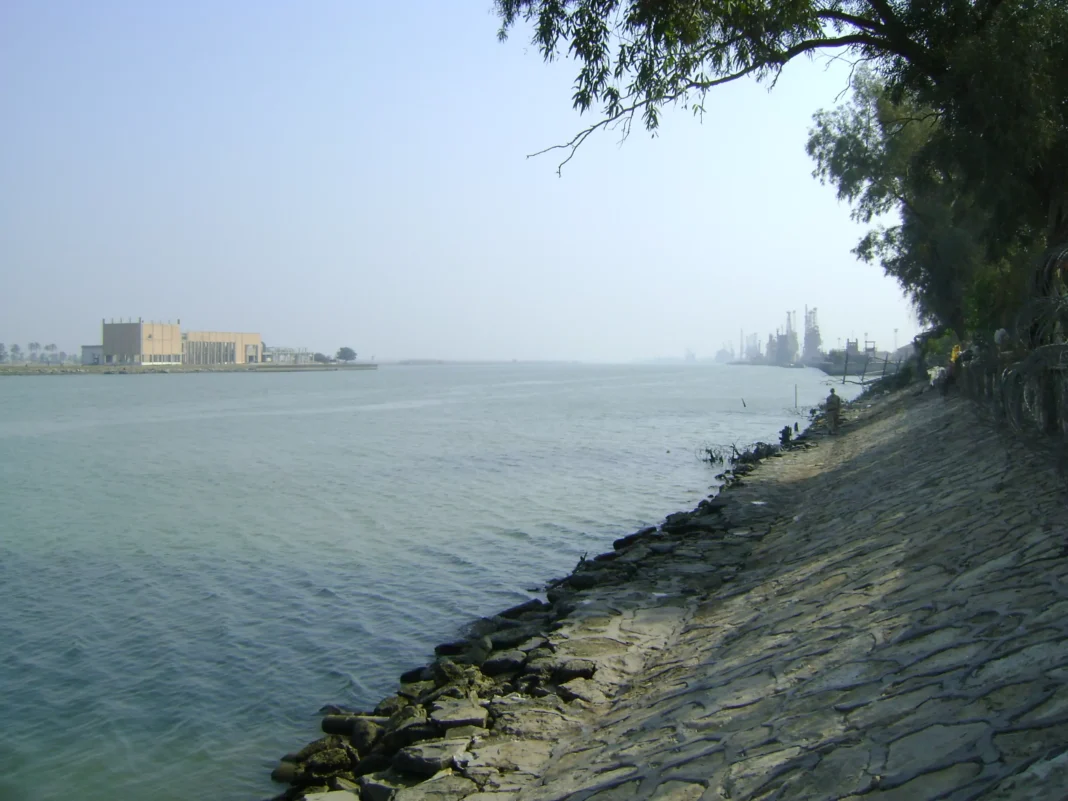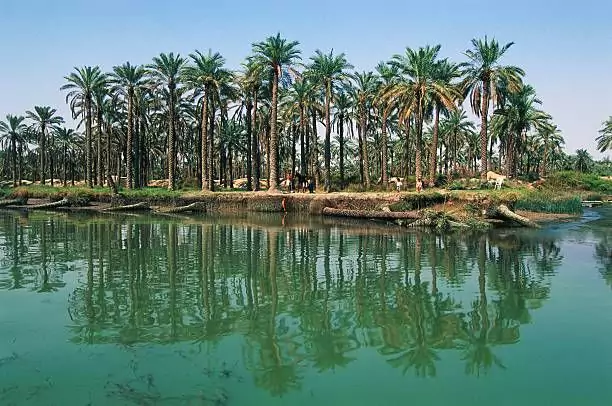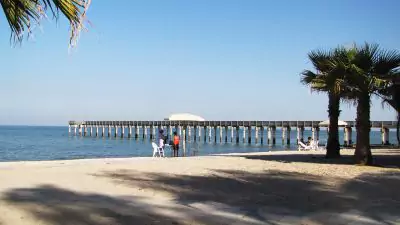Shatt al-Arab, a majestic waterway formed by the confluence of the Tigris and Euphrates rivers, offers a unique blend of natural beauty, cultural richness, and historical significance. Located in Basra, the port city of southern Iraq, Shatt al-Arab presents a tranquil escape for travelers seeking an off-the-beaten-path experience.
A River’s Tale: History and Significance
Shatt al-Arab holds a prominent place in history, having witnessed the rise and fall of civilizations. Its banks have been home to ancient Sumerians, Babylonians, and Assyrians, and its waters have facilitated trade and cultural exchange for millennia. The river’s strategic importance continued through the Islamic Golden Age and into modern times.
Today, Shatt al-Arab remains a vital waterway for Iraq, serving as a major shipping route and a source of irrigation for the surrounding agricultural lands. It also offers a unique ecosystem, supporting diverse flora and fauna, including date palm groves and migratory birds.
Experiencing the Serenity of Shatt al-Arab
The charm of Shatt al-Arab lies in its tranquil atmosphere and the opportunity to connect with nature and local life. Here are some ways to experience the river’s beauty:
- Boat Trips: Embark on a leisurely boat trip along the river, enjoying the scenic views of palm groves, traditional villages, and bustling ports.
- Sunset Cruises: Witness the magical sunset over the river, casting a golden glow on the water and creating a memorable experience.
- Fishing: Try your hand at fishing in the river, known for its abundance of fish species.
- Picnics: Enjoy a relaxing picnic on the riverbank, surrounded by the soothing sounds of nature.
Exploring Basra’s Riverside Gems
Basra, often referred to as the “Venice of the East,” offers a wealth of attractions along the banks of Shatt al-Arab.
- Basra Corniche: Stroll along the Corniche, a waterfront promenade lined with palm trees, cafes, and restaurants, offering stunning views of the river.
- Sayab’s House: Visit the historic home of renowned Iraqi poet Badr Shakir al-Sayyab, located near the river, and learn about his life and work.
- Sinbad Island: Take a boat trip to Sinbad Island, a small island in the river believed to be the inspiration for the legendary sailor Sinbad.
- Basra Museum: Explore the Basra Museum, showcasing the region’s rich history and cultural heritage, including artifacts from ancient civilizations.
- Latin Church: Discover the historic Latin Church, a testament to Basra’s diverse religious heritage.
Practical Information for Visiting Shatt al-Arab
- Location: Shatt al-Arab, Basra, Iraq
- Best Time to Visit: The cooler months from October to April offer pleasant weather for outdoor activities.
- Contact Information: Contact the Basra Tourist Information Center for up-to-date information on tours and activities.
Tips for Visitors:
- Respect local customs and traditions, especially when visiting religious sites.
- Dress modestly, particularly in public areas.
- Learn some basic Arabic phrases to enhance your interactions with locals.
- Bargaining is common in local markets, so don’t hesitate to negotiate prices.
Beyond the Riverbank: Exploring Basra
While Shatt al-Arab is a major highlight, Basra offers other attractions worth exploring:
- The Great Mosque of Basra: Visit this impressive mosque, known for its beautiful architecture and peaceful atmosphere.
- Basra Sports City: Catch a local football match or enjoy other sporting events at this modern sports complex.
- Basra International Stadium: Experience the excitement of a football match at this state-of-the-art stadium.
- Al-Hussain Mosque: Explore this historic mosque, known for its intricate decorations and religious significance.
- Shopping at Basra’s Souks: Immerse yourself in the vibrant atmosphere of Basra’s traditional markets, offering a variety of goods, from spices and textiles to handicrafts and souvenirs.
Navigating Basra
- Transportation: Basra International Airport (BSR) connects the city to international destinations. Within the city, taxis and buses are readily available.
- Currency Exchange: The local currency is the Iraqi dinar (IQD). Currency exchange services are available at banks and exchange bureaus.
- Cultural Etiquette: Iraqis are known for their hospitality. It’s customary to greet people with a handshake and a smile. Show respect for elders and avoid public displays of affection.
Real-Life Experiences: Shatt al-Arab Memories
Many travelers have shared their memorable experiences along Shatt al-Arab, describing the river’s tranquility, the warmth of the local people, and the unique cultural encounters. One visitor recounted a delightful boat trip with a local fisherman, learning about traditional fishing techniques and enjoying freshly caught seafood. Another shared the joy of witnessing a vibrant sunset over the river, creating a lasting memory of their visit to Basra.
Delving Deeper into Shatt al-Arab’s Ecosystem
Shatt al-Arab is not only a scenic waterway but also a vital ecosystem supporting a diverse range of flora and fauna. The river’s unique environment, where freshwater from the Tigris and Euphrates meets the saltwater of the Persian Gulf, creates a rich habitat for various species.
Flora
The banks of Shatt al-Arab are lined with lush date palm groves, a characteristic feature of the region. These iconic trees provide shade, food, and building materials for local communities. Other plant species found along the river include reeds, mangroves, and various shrubs, contributing to the biodiversity of the ecosystem.
Fauna
Shatt al-Arab is home to a variety of fish species, making it a popular spot for fishing. Common species include carp, catfish, and mullet. The river also attracts migratory birds, providing a stopover point on their long journeys. Birdwatchers can spot species like herons, egrets, and kingfishers along the riverbanks.
Environmental Concerns
Despite its ecological importance, Shatt al-Arab faces environmental challenges, including pollution from industrial and agricultural activities, as well as reduced water flow due to dam construction upstream. Efforts are underway to address these issues and protect the river’s fragile ecosystem.
Shatt al-Arab in Literature and Art
The beauty and historical significance of Shatt al-Arab have inspired numerous writers and artists throughout history. The river has been featured in poems, novels, and paintings, capturing its essence and reflecting its cultural importance.
Poetry
Renowned Iraqi poet Badr Shakir al-Sayyab, who grew up near Shatt al-Arab, often incorporated the river into his poems, using it as a symbol of love, longing, and the passage of time. His evocative verses paint vivid pictures of the river’s beauty and its connection to the people of Basra.
Novels
Several novels have also featured Shatt al-Arab, portraying its role in shaping the lives of the characters and reflecting the social and political realities of the region. These literary works offer insights into the river’s cultural significance and its impact on the local communities.
Paintings
Many artists have captured the scenic beauty of Shatt al-Arab in their paintings, depicting the river’s tranquil waters, lush vegetation, and traditional boats. These artworks provide a visual representation of the river’s charm and its enduring appeal.
Shatt al-Arab: A Unique Travel Experience
Shatt al-Arab offers a unique travel experience, combining natural beauty, cultural immersion, and historical exploration. Whether you choose to relax on a boat trip, explore historical sites, or simply soak in the atmosphere along the riverbank, a visit to Shatt al-Arab promises a memorable journey into the heart of southern Iraq.
Arabic Phrases for Travelers in Basra
- Greetings
- Hello: As-salamu alaykum (as-salamu alaykum)
- Good morning: Sabah al-khair (Sabah al-khair)
- Good evening: Masaa al-khair (Masaa al-khair)
- Thank you: Shukran (Shukran)
- You’re welcome: Afwan (Afwan)
- Directions
- Where is…? : Ayna…? (Ayna…?)
- Left: Yasār (Yasār)
- Right: Yamīn (Yamīn)
- Straight ahead: Amāman (Amāman)
- Dining
- Delicious: Laḏīḏ (Laḏīḏ)
- The bill, please: Al-ḥisāb, min faḍlik (Al-ḥisāb, min faḍlik)
- Water: Mā’ (Mā’)
- Emergencies
- Help!: Al-musāʿadah! (Al-musāʿadah!)
- I need a doctor: Aḥtāj ilā ṭabīb (Aḥtāj ilā ṭabīb)
- Police: Shurṭah (Shurṭah)
- Shopping
- How much is this?: Kam hāḏā? (Kam hāḏā?)
- Too expensive: Ghālī jiddan (Ghālī jiddan)
- I don’t want it: Lā urīduh (Lā urīduh)






